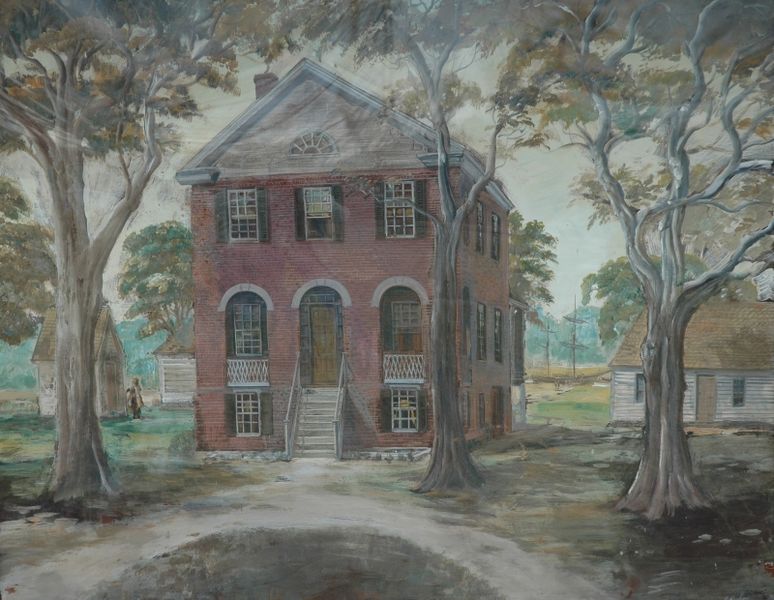Chesterville

Chesterville was the name of the Wythe family plantation in Elizabeth City County, Virginia, alongside the Back River. The property would grow to eventually encompass 1,050 acres, beginning with a modest purchase by George Wythe's great-grandfather, Thomas Wythe I, in 1691. George Wythe inherited the property after the death of his older brother, Thomas Wythe IV, sometime before July, 1755.[1]
The former Chesterville property is now part of NASA's Langley Research Center, in Hampton, Virginia.
The Property
The 1050 acres which later made up Chesterville, the property owned by the Wythe family, was originally granted to John Laydon (500 acres), Thomas Garnett (200 acres), and Elizabeth Thompson (200 acres) in 1635. In 1648, John Howitt bought 204 acres of Laydon's tract, later sold it to Humphrey Lee, whose heirs sold the tract to Edmund Swaney.[2]
In 1691, Thomas Wythe I began to purchase land that later became Chesterville, starting with Edmund Swaney's 204 acres. This piece of property was identified in a court order dated 18 January 1697 as being the "Oares Plantation." Grandson Thomas Wythe III inherited this tract of land, along with the manor house, the house believed to have been the birthplace of George Wythe.[3] The manor house is presumed to the the stone foundation to the north of the brick house. This house has tentatively been dated by a J. Benthall as third or fourth quarter 17th century based on surface artifacts. That would place this house as one of the 'Buildings, Edifices, and Houses' described on the property when purchased by the Wythes in 1691. The stone cobbles are quartzite sandstone and native to the Tidewater region of Virginia.[4]
George Wythe Inherits
The Chesterville property was left to George's older brother, Thomas Wythe IV, and upon his death George Wythe inherited the property.[5] After his first wife's death George Wythe lived on the property from 1748-1755. In 1771 Wythe bought windows, nails, and hardware from London to build a new house. There is only one known photograph of the two-story house Wythe built taken before fire destroyed it in 1911.[6] Local legend holds that the house was designed by Thomas Jefferson, though no direct evidence for this exists one way or the other. Construction was similar to the Fairfax County Courthouse of 1800, and can also be compared to Pavilion VII at the University of Virginia and Berry Hill Plantation in Orange County, VA. When the state courts moved to Richmond in 1788, Chancellor Wythe followed, but he continued to operate the property as a plantation until 1792.[7]
George Wythe purchased surrounding farms, and by 1771 held 1050 acres of land. He grew tobacco, corn, wheat, and barley. He also raised livestock including cattle, and maintained apple and pear orchards. During the Revolutionary War, his overseer Hamilton St. George proved to be a spy, giving the British information and supplies from Chesterville.[8]
In 1795, George Wythe tried to sell Chesterville, which included the house, servant's quarters, kitchen, stable, store house, and a granary and wharf where ships could dock. After the first purchaser defaulted on their loan, George Wythe bought the property at auction, and sold it in 1802 to Col. Houlder Hudgins.[9]
The Property Today
In 1911, a kerosene stove in the kitchen exploded and the house was destroyed. The owner at the time continued to rent the plantation as farmland until the 1930's. In 1950 he sold the plantation to the National Advisory Committee for Aeronautics (NACA). Included on the property are areas identified as the Chesterville house foundation, Oares stone foundation about 100' to the north, the foundation of a brick kiln about 400 feet east, a wharf, and the Winder-Garrett cemetery about 1000 feet west.[10]
References
- ↑ W. Edwin Hemphill, "George Wythe the Colonial Briton: A Biographical Study of the Pre-Revolutionary Era in Virginia," PhD diss., University of Virginia, 1937, 75.
- ↑ NASA Cultural Resources (CRGIS), "Chesterville Plantation House," Chesterville Plantation Site.
- ↑ Ibid.
- ↑ Ibid.
- ↑ Ibid.
- ↑ Ibid.
- ↑ Ibid.
- ↑ Ibid.
- ↑ Ibid.
- ↑ Ibid.